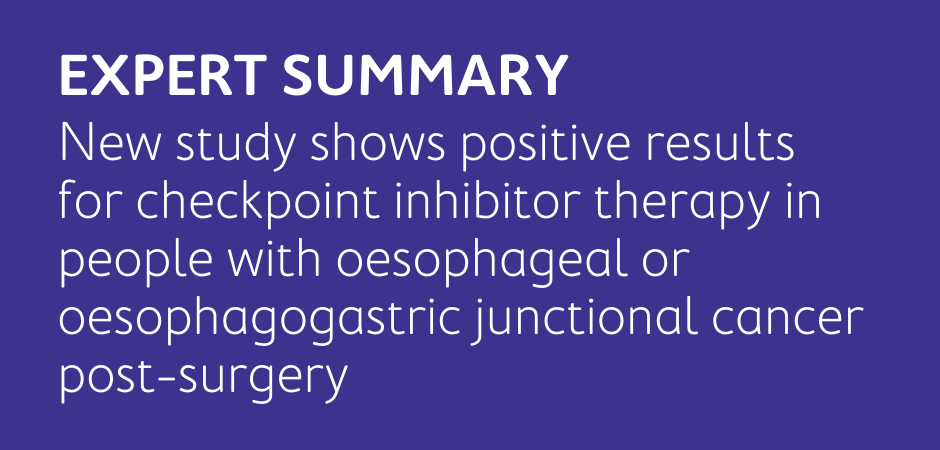
Key messages from Kelly et al. New England Journal of Medicine 2021; 384: 1191–203
- This recent well-designed global study examined the effects of nivolumab, a type of therapy called a PD-1 checkpoint inhibitor, on the recurrence of oesophageal and oesophagogastric junctional cancer after previous surgery and chemoradiotherapy. This group is at high risk of recurrence.
- Use of nivolumab over one year resulted in 31% reduction in risk of recurrence or death and a disease-free survival that was more than twice as long as the placebo group (22.4 vs 11.0 months, respectively) for patients with Stage II or III oesophageal or oesophagogastric junctional cancer who had previously undergone surgical resection and pre-surgical chemoradiotherapy.
- A significant disease-free survival benefit was seen in people with tumour-cell PD-L1 expression, which is a known genetic biomarker in these cancers.
- Although the safety profile of nivolumab was similar to that seen in other types of solid tumours, participants who were in the nivolumab group had more adverse events related to the trial regimen in the severe and life-threatening/disabling categories than those in the placebo group (13% vs 6%, respectively).
Discussion points from expert reviewer, Professor David Goldstein
This publication brings very encouraging news for patients with a locally advanced oesophageal and oesophagogastric junctional cancer. A reliable adjuvant therapy is welcome after so many years of uncertainty in this difficult disease with poor outcomes.
Certainly, the benefit of this therapy for squamous cell carcinomas is clearer than the case for adenocarcinomas of the oesophagogastric tract. This was demonstrated by the disease-free survival of 29.7 months with nivolumab versus 11.0 months with placebo in those with squamous cell carcinomas, compared to those with adenocarcinoma taking nivolumab who demonstrated a 19.4 month disease-free survival (vs 11.1 months with placebo).
Although the results of this study are significant and compelling, there are several potential drawbacks indicating that it is premature to encourage nivolumab as routine practice.
Firstly, the primary endpoint for this study was disease-free survival, which is the time from the date of randomisation to the first date of disease recurrence or death. While overall survival was a secondary endpoint, we need to see significant overall survival outcomes to be sure if this therapy is the paradigm shift in oesophageal and oesophagogastric junctional cancer that it seems to be.
Secondly, the issue remains of screening for reliable biomarkers in these tumours. The authors screened for tumour-cell PD-L1 expression and although this is considered a marker of therapeutic benefit for checkpoint inhibitor therapy, it is not necessarily a good marker for responses in oesophageal and oesophagogastric junctional cancer. Screening for other biomarkers may have provided better markers of suitability of this treatment for these patients. Thus, additional data on the tumour mutational burden (TMB) is warranted. The aim would be to gather more expression data like this to show a subgroup of these cancers would be targetable with adjuvant therapy. This may help identify suitable patients for this therapy and also prevent patients from receiving unnecessary treatment.
Despite the limitations of these early results, and while we await more complete data sets and overall survival data, it is so very encouraging to have early evidence for a new therapy in these devastating cancers.
About Professor David Goldstein, Pancare Medical Advisor

Prof Goldstein is a conjoint clinical professor at the Prince of Wales Clinical school and Senior Staff Specialist in the Department of Medical Oncology at the Nelune Cancer Centre, Prince of Wales Hospital in Sydney. His clinical interests are treatment of GI malignancies including pancreas cancer, colorectal cancer, anal carcinoma, hepatobiliary and upper GI malignancy.
He has been involved in a variety of clinical research projects ranging from laboratory basic science to novel therapeutics trials to psychosocial aspects of cancer care. He has a particular focus upon migrant populations and their unmet needs, treatment related toxicity in particular chemotherapy related neurotoxicity and post cancer chronic fatigue, and other aspects of cancer survivorship. He has been Principal Investigator of a number of NHMRC and Cancer Australia funded therapeutic trials, including both investigator initiated and as Australian lead investigator for multinational studies.
He is the Director of the UNSW Translational Cancer Research Network and is the Adult Program Leader of the UNSW National Cancer Survivors Centre.
Reference
Kelly RJ, Ajani JA, Kuzdzal J, Zander T, Van Cutsem E, Piessen G, Mendez G, Feliciano J, Motoyama S, Lièvre A, Uronis H, Elimova E, Grootscholten C, Geboes K, Zafar S, Snow S, Ko AH, Feeney K, Schenker M, Kocon P, Zhang J, Zhu L, Lei M, Singh P, Kondo K, Cleary JM, and Moehler M, for the CheckMate 577 Investigators*. Adjuvant Nivolumab in Resected Esophageal or Gastroesophageal Junction Cancer. N Engl J Med 2021; 384: 1191–203.
Read more . . .

